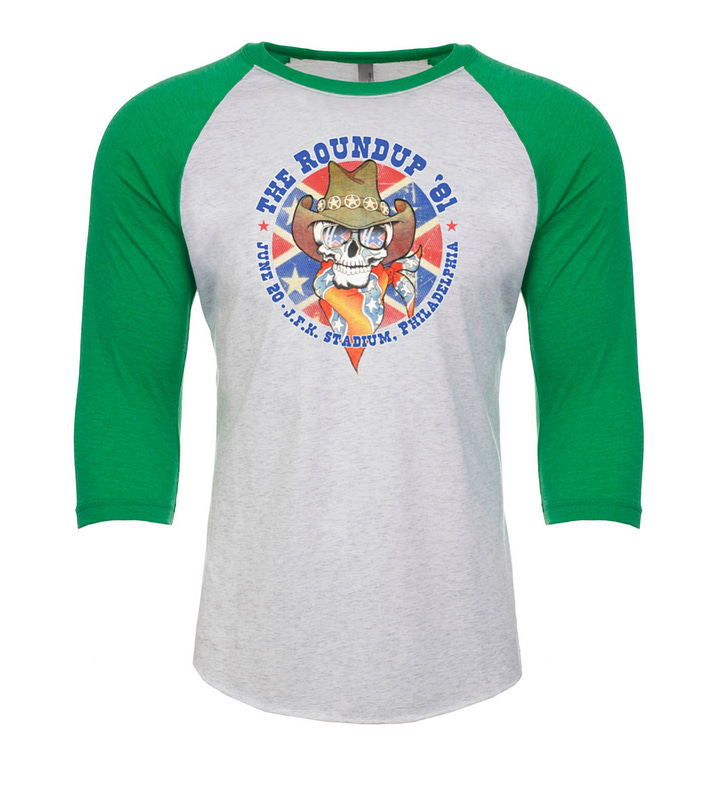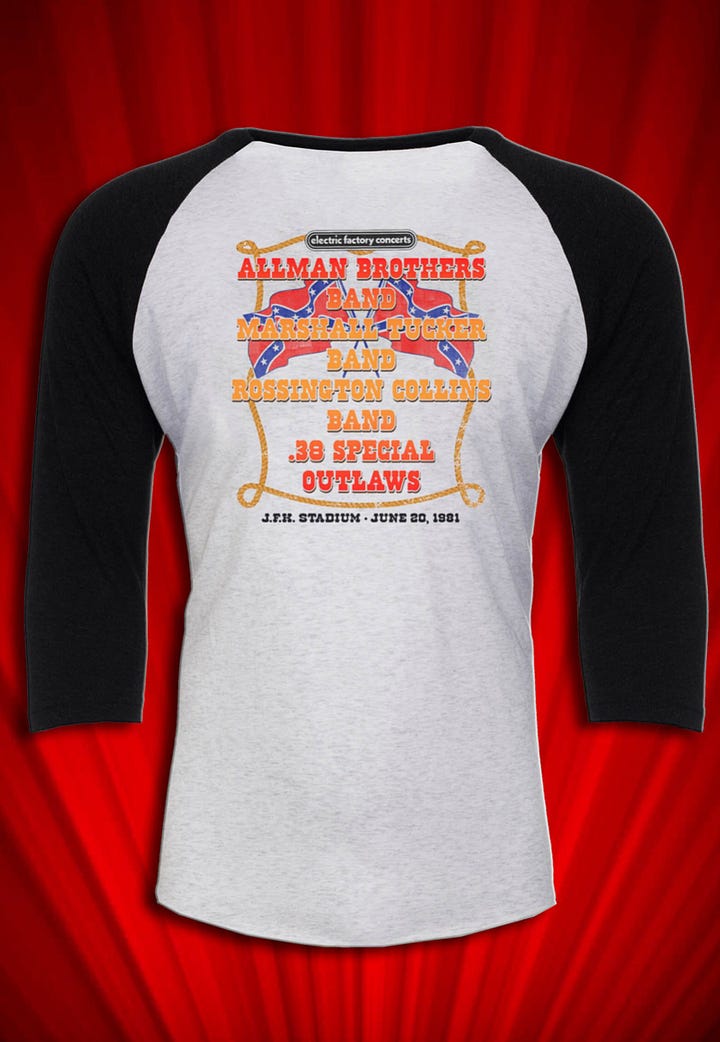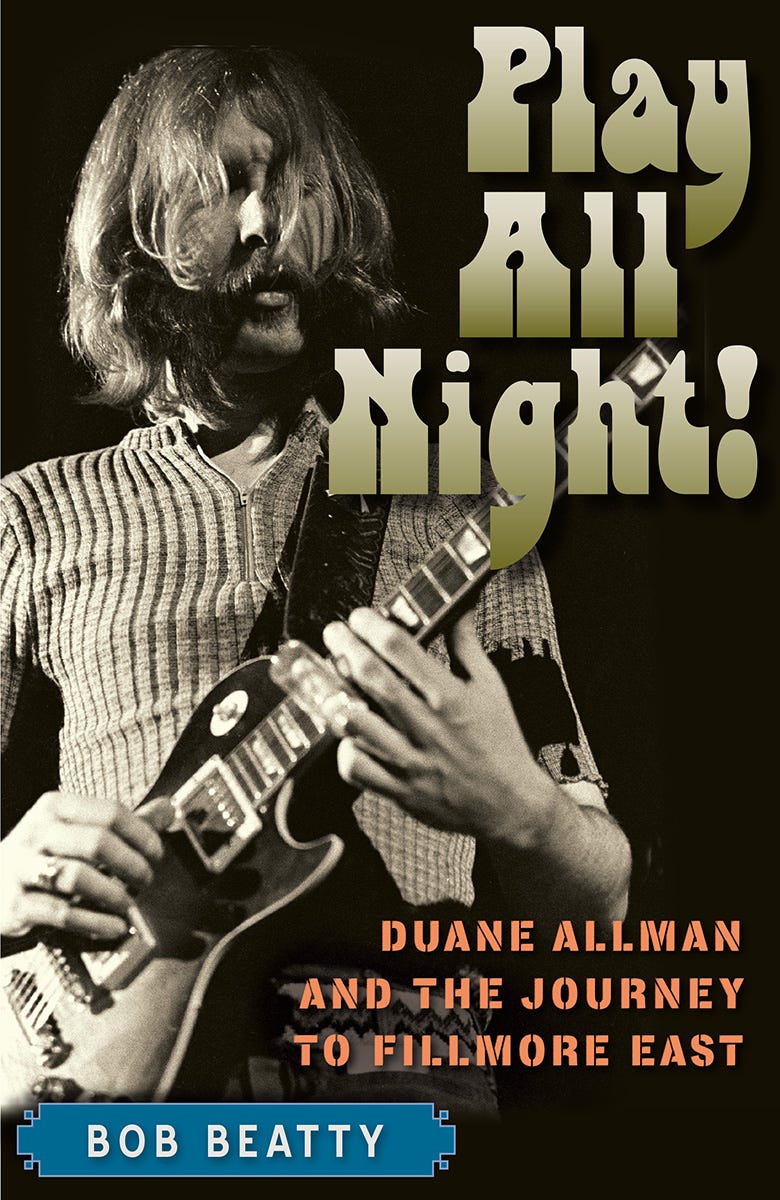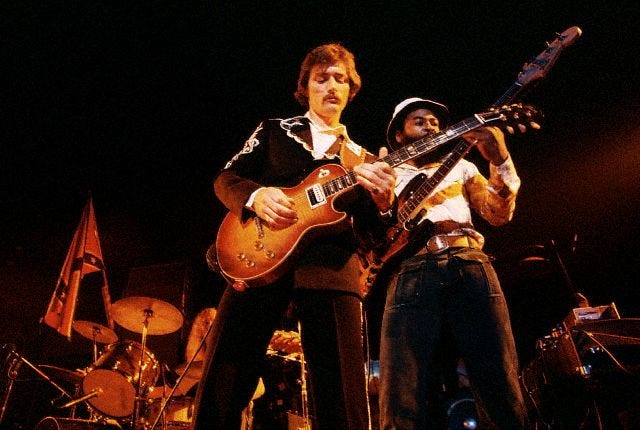Southern rock (again)
More on the Allman Brothers’ connections
I adapted this essay from a longer talk I gave on Zoom.1 A former graduate student of mine moderated. It was the Unending Conversation2 in action.
She well-prepared and asked questions that gave me a lot of room to expand on concepts I’d written about in Play All Night and gave me room to explore the story in some new ways.
This week, I’m sharing my answer to her questions about the Allman Brothers Band and Southern rock.1
Why did the band members dislike being labeled Southern rock?
AND
How do you reconcile the problematic imagery they used in promoting their music?
These are questions I had to answer for myself when I wrote Play All Night.2
I’ll start with the term Southern rock.
I have yet to find a better definition than Scott Bomar’s: Southern rock is music “rooted in a specific time, a particular place, created by musicians with similar formative and cultural experiences, [that] served as a key expression of a uniquely countercultural movement of the South.”
I date 19733 as the launch of the Southern rock “genre”—it lasted through the early 1980s, when a new punk- (not blues-) influenced sound emerged in Athens, Georgia, with R.E.M., Pylon, and the B-52s.
In sum:
Southern rock is musicians making music in the South.
The timing is a bit amorphous.4
The change from a blues/country influence to punk.5
Are the ABB Southern rock?
There are three arguments here:
1. NO. The Allman Brothers aren’t Southern rock. They’re too good to be lumped in with other bands of that genre. They invented it all. Everything that came after is derivative.
Yes, they were musician’s musicians—a cut above the rest. Yes they were the first rock band to emerge from the South and paved a way for musicians across the region to succeed. And yes, Southern rock eventually devolved into a stereotype they transcended.6
2. YES! ABBsolutely the Allman Brothers Band are Southern rock. Follow their lineage.
There was no such thing as Southern rock in 1969 when Duane founded the band. Jerry Wexler called the band’s sound “Swamp Music”7 (also how Capricorn advertised the debut album).8
But not only did the Allman Brothers’ success open the door for southern musicians, the band became the biggest band in the country as their sound evolved from the twin-guitar attack of the Duane lineup as Dickey Betts’s country-inflected guitar gained prominence and “Ramblin’ Man” hit #2.
It was the launch of an era.
3. UM…SORT OF? They exemplified Southern rock for a time but the sum total of their career is much greater than their Southern rock period.
This is where I fall.
It acknowledges the Allman Brothers Band existed at a high level before and after their Southern rock years. They transcended the “genre.”
Here’s Mikal Gilmore:
“Though later bands would reduce Southern Rock to a reactionary posture and a crude parody of machismo9, the Allmans began the movement as a blast of musical and cultural innovation. In fact, their outlooks and music were emblematic of the American South’s ongoing struggle for redefinition, and for its mounting desire to move away from its violently earned image as a region of fierce racism and intolerance….
Said Dickey, “We did appreciate our culture, and a lot of people in the South were proud of the Allman Brothers, because we were typically and obviously Southern. That was part of our aura…. We were just a good thing for some people to identify with, and obviously, we influenced the music from the South a great deal. A lot of musicians thought, ‘Hey, they’re speaking for or representing the way I feel’ — and that was a cool thing.”10
TL; DR: They’re Southern rock.
And if you want definitive proof, how about the Allman Brothers Band themselves?
No, not Gregg’s oft-cited response that “All rock ’n’ roll came from the South, it is southern by definition. You might as well call it Rock rock.” (He’s right.)
But the liner notes to their 1981 Arista album Brothers of the Road.11
Look closely towards the bottom…
“This album is titled in honor of the musicians who have made Southern rock a traditional art form in American music.”
The ABB’s Southern rock period
Ironically, it was their association with Southern rock that led to their break-up after the album’s release. The music and its look had gone completely out of favor.
Said Dickey, “We had been credited as being a flagship band [and] all of a sudden managers and record company people were telling us we should never use terms like ‘Southern rock’ or that we couldn’t wear hats or boots onstage, that it was embarrassing to a modern audience.”12
I think of the Allman Brothers’ Southern rock period as encompassing a six-album run from 1973-1990:
🍄Brothers and Sisters (1973) Win, Lose, or Draw (1975)13 the Chuck/Lamar lineup & the height of their fame
🍄Enlightened Rogues (1979) Reach for the Sky (1980) & Brothers of the Road (1981) from the 10th anniversary reunion
🍄Seven Turns (1990) because it has a similar vibe to the previous era (without the disco sheen)14 and it was promoted as Southern rock.15
Here’s Dickey about 10 years after the above quotes, in an interview with Alan Paul:
“It wasn't called Southern rock until a lot of bands saw they could succeed by playing the way they were always told they couldn't succeed…. There was a need to call the music something. Somebody tagged it Southern rock. I really don't think there is a need to call it that anymore. In fact, as far as I'm concerned, we're just a progressive rock band from the South.
I'm damned proud of who I am and where I'm from. But I think the title pigeonholes us a little bit, and forces people to expect certain types of music from us.”
Southern rock and Confederate iconography
Southern rock’s embrace of Confederate iconography has been problematic from the beginning and the Allman Brothers Band are not immune to the criticism.
Their 1974 tour logo featured Robert E. Lee16 on horseback and over the years, the Rebel flag appeared on stage, on posters, and on merchandise.
All despite the group being integrated from its founding and having two Black members from 1972-76—Jaimoe and Lamar Williams (above, with Dickey).
Confederate iconography wasn’t limited to the Allman Brothers’ marketing team. Promoters also got into the act.
Here are but two examples. (Note that neither are for shows in the South.)
1981 Philadelphia


1991 Santa Barbara
So why the rebel flag?
I’ll quote myself from Play All Night:
By using the flag, Southern rock bands—the Allman Brothers included—seemed to pay little attention to the reality that flying the rebel flag redeemed the racism in their midst.
Fifty years later, the condemnation of such imagery is near universal. But even in the 1970s, the prominent display of the rebel flag led critics and fans to dismiss the South and Southern rock as preternaturally backwards, behind the times, and racist.
And displaying the rebel flag was exactly those things. Southern rock’s embrace of Confederate imagery signaled public acceptance of segregationist ideals. But band members, almost all educated in southern schools, considered their flag waving as an expression of regional pride and defiance.
Some southern schools taught that the Confederate cause was just and that its flag signified rebellion in the spirit of the American Revolution rather than an act of treason against the United States to create a southern slave nation. The acceptance of the flag was a success of the Lost Cause narrative that framed the Civil War as a valiant defense of southern virtue against overwhelming odds.
To those critics and fans who condemned the public embrace of Confederate imagery in the 1970s, we can only say amen.17
Southerners (myself included) were taught the flag represented exactly what we Southern rock represented: the southern rebel archetype fighting against the system. Waving it was saying: “Up yours!” to the man, to Yankee outsiders, and to Neil Young for the gall to call Southerners out in “Southern Man” and “Alabama”
As a marketing campaign, the use of the flag was incredibly successful, but only for a time. But by the mid-1980s, Southern rock evolved to represent negative southern stereotypes.
MTV was the death knell. As good as their music was, the Southern rock “look” didn’t translate well to video.
The “genre” (it never really was one) petered out. Southerners continued to make rock music, but the bluesy/country/boogie melange of Southern rock fell out of vogue in a BIG way in the 80s.
What about the Allman Brothers Band?
We know they didn’t care for the term “Southern rock,” but what about the imagery?
Though they were not signing off on their merchandise and marketing in the 1970s (these choices were made in the back office18), they have all disavowed their association with the imagery.
Gregg was perhaps the most emphatic.
“I was taught how to play music by these very, very kind older Black men. My best friend in the world is a Black man, Chank Middleton.
If people are gonna look at that flag and think of it as representing slavery, then I say burn every one of them.”19
Thanks for being here, until next time…
Here’s video of my answer to her questions.
A marketing term really, which is part of the reason the “Allman Brothers are way more musical” works.
With the release of the ABB’s Brothers and Sisters and Skynyrd’s debut album
This is why the Athens bands aren’t Southern rock. Timing is why the Athens-formed Drive-By Truckers or Widespread Panic aren’t Southern rock. The term was simply out of use when they emerged on the scene.
Have I mentioned Play All Night before 🍄? Get yers: https://www.amazon.com/dp/0813069505
“Southern rock has a sameness that makes groups like Wet Willie, Marshall Tucker, Charlie Daniels, et al., seem indistinguishable,” wrote an unnamed critic at The Gateway of the University of Nebraska Omaha.
A term he created and lumped in everyone from Tony Joe White (Louisiana) to Delaney and Bonnie (California, by way of Mississippi and Missouri) to Creedence Clearwater Revival (California). Here’s an online source of
Lester Bangs called Skynyrd “crude thunderstomper hillbillies” in his review of 1976’s Gimme Back My Bullets.
Mikal Gilmore, Night Beat: A Shadow History of Rock & Roll (New York: Anchor, 1999), 128-9. The interview is from 1990.
Universally reviled as the band’s worst—including by the band themselves. But it has its defenders.
Gilmore, 117.
Both Brothers and Sisters and Skynyrd’s debut define the Southern rock “sound” such as it was. One reason (to me) is the prominence of the piano in both bands—Chuck Leavell and Billy Powell. The piano kind of defines the Southern rock era to my ear and it’s one reason I add Seven Turns into the ABB’s “Southern rock” period—Johnny Neel’s piano.
“Pegasus” and “True Gravity”—my two favorite instrumentals of their era—sound most similar, but I could hear songs like “Let Me Ride” “Low Down Dirty Mean” “Good Clean Fun” event “Gambler’s Roll” on Enlightened Rogues.
That plus the distinct turn the band made to bring some of the psychedelic back on Shades of Two Worlds in 1991—which better reflected what the Warren & Woody lineup was doing in the early 90s. Basically putting the band back on the map for good.
Or someone who looks a lot like him.
Play All Night, 5.
That’s not an excuse, but it is fact.










